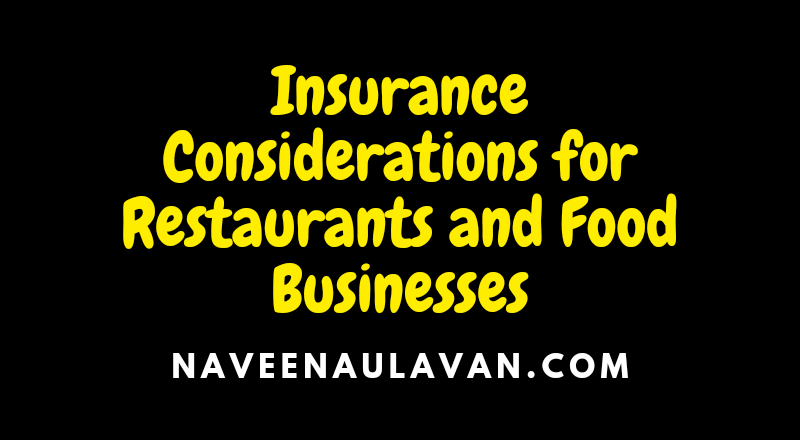Running a restaurant or any food-related business comes with its own set of risks. From property damage to liability claims there are various scenarios that can negatively impact your business financially. This is where insurance plays a crucial role in protecting your restaurant from potential losses. In this article we will explore the key insurance considerations for restaurants and food businesses helping you understand the types of insurance coverage you may need to safeguard your establishment.
1. Property Insurance:
Property insurance is essential for any restaurant or food business. It protects your physical assets such as buildings equipment and inventory from risks like fire theft vandalism or natural disasters.
Having property insurance ensures that you can recover financially in case of property damage or loss. It covers the cost of repairing or replacing damaged property and can help you get your business up and running quickly.
2. General Liability Insurance:
General liability insurance is another crucial type of coverage for restaurants and food businesses. It provides protection against lawsuits and claims arising from third-party bodily injury property damage or advertising injuries.
In the restaurant industry accidents can happen such as slip and falls food poisoning or allergic reactions. General liability insurance covers the legal costs and settlements associated with such claims keeping your business financially secure.
3. Workers’ Compensation Insurance:
Running a restaurant involves a significant number of employees and their safety should be a top priority. Workers’ compensation insurance provides coverage for employees who suffer work-related injuries or illnesses.
If an employee gets injured while on the job workers’ compensation insurance will cover their medical expenses lost wages and rehabilitation costs. By having this insurance you not only protect your employees but also protect your business from potential lawsuits.
4. Liquor Liability Insurance:
If your restaurant serves alcohol liquor liability insurance is crucial. It protects your business from legal claims and lawsuits that may arise due to alcohol-related incidents involving your customers such as accidents injuries or property damage.
Liquor liability insurance covers legal defense costs settlements and judgments ensuring that your business is protected against the potential financial consequences of serving alcohol.
5. Business Interruption Insurance:
Business interruption insurance is designed to help you recover lost income and cover ongoing expenses in case your restaurant is temporarily unable to operate due to a covered event such as a fire or natural disaster.
This type of insurance provides financial support during the period of interruption including the revenue you would have earned had the interruption not occurred. It can help you pay rent salaries loans and other fixed expenses until your business can reopen.
6. Cyber Liability Insurance:
With the increasing reliance on technology in the food industry cyber liability insurance has become necessary. This coverage protects against cyber threats such as data breaches hacking or identity theft which can result in financial loss reputational damage and legal liabilities.
If your restaurant stores customer information accepts online orders or handles credit card transactions investing in cyber liability insurance can safeguard your business from the financial impact of a cyber attack.
7. Umbrella Insurance:
While primary insurance policies provide coverage up to a certain limit they may not be sufficient to cover high-value claims or extraordinary circumstances. That’s where umbrella insurance comes into play.
Umbrella insurance provides an extra layer of liability protection that extends beyond the limits of your primary policies. This coverage is particularly useful for restaurants and food businesses that want additional financial protection against large and potentially devastating claims.
8. Food Contamination Insurance:
Food contamination incidents such as product recalls or contamination leading to illness outbreaks can have severe consequences for food businesses. Food contamination insurance provides coverage for the financial losses associated with such incidents.
This insurance can cover costs like business interruption product recall liability claims and even public relations expenses to mitigate the reputational damage that may occur due to a contamination event.
Conclusion:
Insurance is a vital aspect of risk management for restaurants and food businesses. By understanding the various types of insurance available and their specific coverages you can make informed decisions to protect your business financially. It is recommended to consult with an insurance professional who specializes in the restaurant industry to ensure you have the right insurance coverage tailored to your specific needs. Remember investing in comprehensive and adequate insurance coverage can give you peace of mind and protect you from potential financial losses in the long run.
